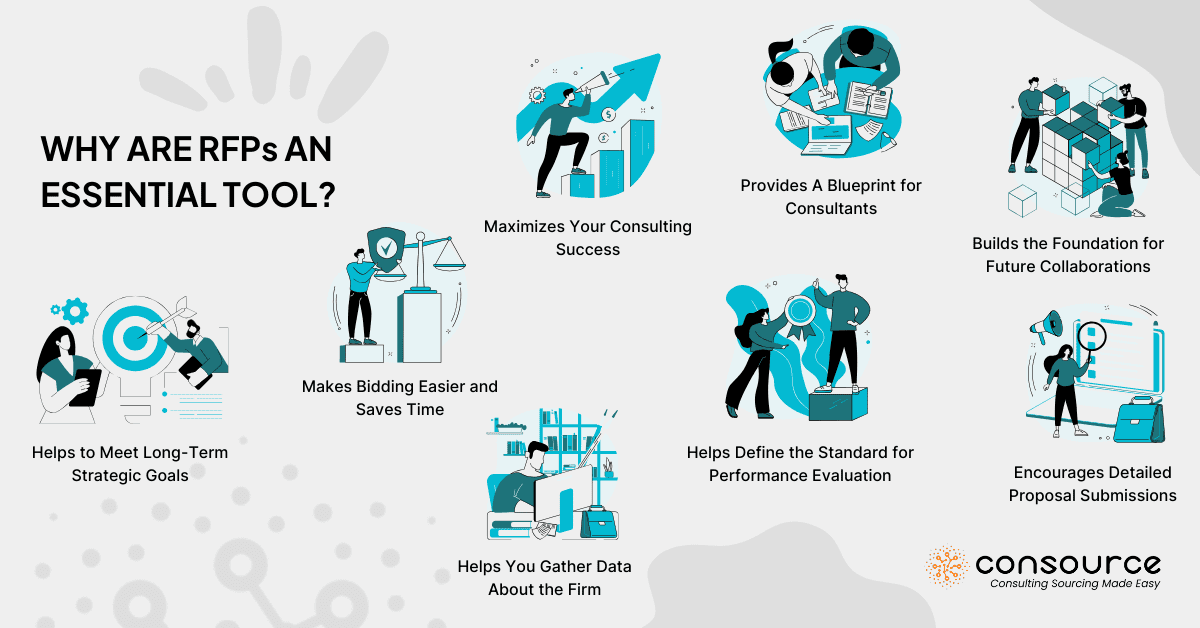Creating an exceptional Request for Proposal (RFP) for consulting services is the bedrock of successful project execution and a significant return on investment. This document is crucial for businesses aiming to drive transformation and government entities implementing large-scale initiatives.
Much like a well-crafted screenplay sets the stage for a blockbuster movie, a meticulously prepared RFP forms the backbone of your consulting procurement process. It provides structure, clarity, and direction, ensuring that every aspect of your project is aligned with your strategic goals. This article delves into the intricacies of crafting an effective RFP, highlighting its significance and providing a comprehensive guide to ensuring its success.
Understanding RFPs, RFQs, and RFIs in Consulting Services
What Is an RFP for Consulting?
A Request for Proposal (RFP) for consulting services is a comprehensive document that delineates all pertinent details of a planned project, including the customer’s expectations and specific requirements. It plays a pivotal role in the consultant selection process by providing a detailed scope of work, enabling potential consultants to gauge accurately whether they can meet the project’s demands and wish to undertake it.
The RFP outlines the client’s objectives, pinpoints the main issues to be addressed, and specifies the criteria for evaluating proposals, including how consultants will be rewarded and any unique requirements or standards expected of them. This document ensures all potential consultants are on the same page and can propose solutions that align with the client’s needs.
RFP vs. RFI vs. RFQ: Clarifying the Differences
While RFPs are common in consulting, it’s important to differentiate them from other procurement documents like Requests for Information (RFIs) and Requests for Quotations (RFQs).
Request for Information (RFI)
An RFI is typically used as a preliminary step in the procurement process. Its primary purpose is to gather general information about the capabilities, services, and credentials of potential consultants or firms. RFIs help clients determine which consultants are well-suited to fulfill the project requirements and whether their approach and culture align with the client’s organization. This is crucial in consulting, where the fit between a consultant’s approach and a client’s organizational culture can significantly impact the project’s success.
Request for Quotation (RFQ)
Unlike RFPs, RFQs are usually employed when the requirements are standardized, and the primary concern is the cost associated with the service or product. In consulting, RFQs are less common because consulting services often vary greatly in scope and execution, requiring a tailored approach. However, RFQs may be relevant in situations where consulting services are more commoditized, such as in IT consulting for time and materials-based projects, where the consultant’s time is the primary cost being assessed.
Linkages and Sequential Use
In practice, RFIs, RFPs, and RFQs can be used sequentially to streamline the procurement process:
- RFI to RFP: An RFI can be issued to shortlist potential consultants based on general information about their services. Following this, an RFP can be issued to the shortlisted candidates to submit detailed proposals based on specific project requirements.
- RFI to RFQ: For more standardized consulting needs, an RFI may precede an RFQ to first identify firms that meet basic criteria and then invite them to compete based on price and specific service terms.
Key Takeaway: Understanding the distinctions and appropriate applications of RFPs, RFIs, and RFQs is critical in the procurement process, especially in consulting where the suitability of the solution and the consultant’s approach to problem-solving are as crucial as the cost.
Why Do RFPs Matter?
The Request for Proposal (RFP) is not merely a procedural document; it is an essential tool in the consulting industry. Even in scenarios where a bid might not immediately be launched, crafting an RFP can provide innumerable benefits. This strategic document serves as a blueprint for the project, enhancing the overall consultancy process by ensuring clarity, focus, and alignment with strategic goals.

Maximizes Your Consulting Success
An RFP acts as a fundamental blueprint for your project. Its meticulous preparation allows you to articulate the core needs and specifics of the project, sharpening your focus and establishing clear objectives. This preparatory step is critical as it lays the groundwork for all subsequent actions and decisions, significantly increasing the likelihood of the project’s success by ensuring all stakeholders are aligned and informed.
Provides A Blueprint for Consultants
At the heart of every RFP is the aim to achieve clarity. It presents potential consultants with a detailed and clear picture of the project’s requirements, the challenges it aims to address, and the outcomes it seeks to achieve. This clarity is crucial as it allows consultants to understand your exact needs and craft their strategies and proposals to meet these specific demands effectively. Such transparency not only facilitates a more tailored approach but also enhances the quality of responses received, enabling better and more relevant solutions.
Helps to Meet Long-Term Strategic Goals
An RFP serves as more than just a document for a single project; it acts as a strategic tool that aligns with broader business objectives. By clearly outlining the project’s direction, it helps streamline efforts towards achieving overarching company goals and long-term strategic aims. This strategic alignment is crucial for maintaining consistency and focus across various levels of project execution and organizational planning.
Makes Bidding Easier and Saves Time
A well-structured RFP simplifies the bidding process significantly. By providing clear information and detailed requirements, it enables potential consultants to align their proposals accurately with your needs. This alignment helps in evaluating and comparing bids more efficiently, ensuring that the selection process is both effective and time-efficient. The clear criteria set forth in the RFP reduce ambiguities, making the evaluation process more straightforward and consistent.
Helps You Gather Data About the Firm
The RFP is instrumental in gathering comprehensive data about potential consulting firms. This is particularly valuable when dealing with new consultants or firms. The RFP allows you to delve into the methodologies, resources, and track records of these firms, providing a wealth of information that is crucial for making informed decisions. This process is essential for not only assessing the capabilities and fit of potential consultants but also for building a database of credible partners for future projects.
Helps Define the Standard for Performance Evaluation
One of the most critical functions of an RFP is to establish clear performance standards. These standards serve as key metrics against which the delivery and effectiveness of consulting services can be measured throughout the project’s lifecycle. By defining these performance criteria upfront, the RFP ensures that all parties have a clear understanding of the expectations and deliverables, thus facilitating a more objective and fair evaluation of the services provided.
Encourages Detailed Proposal Submissions
By demanding detailed proposals, an RFP encourages consultants to thoroughly consider how they will meet the project’s requirements. This detailed planning upfront helps to minimize misunderstandings and misalignments, ensuring that the consultant is fully prepared to meet the project’s demands.
Builds the Foundation for Future Collaborations
Even if a consulting firm does not secure a particular project, the insights gained from the RFP process can be invaluable for both the firm and the client. The firm gets a clear sense of what might be expected in future projects, and the client gains insights into the firm’s capabilities, potentially paving the way for future collaborations.
Key Takeaway: The RFP is a critical document in the consulting industry. Its importance transcends the immediate needs of a single project by setting a foundation for success, clarity, strategic alignment, and effective partnerships. Its meticulous preparation can transform the trajectory of a project, ensuring that all parties involved are aligned with the overarching goals of the engagement.
What Are the Key Elements of an RFP?
Crafting an engaging and effective RFP begins with a clear articulation of the project’s underlying motivations. This section is not just about listing the goals; it’s about capturing the essence of your organizational aspirations and challenges, transforming them into a compelling narrative that resonates with top-tier consultants. It’s about communicating the vision and the stakes involved, setting the stage for a partnership that can genuinely transform your operations.
Context: Understanding the ‘Why’ of Your Project
The purpose of your project is the cornerstone of your RFP. It’s not merely about stating needs; it’s about sharing a vision. Why is this initiative crucial for your business? Are you looking to revolutionize your processes, catapult your efficiency, or redefine market standards? This isn’t just another box to tick—it’s the driving force that will attract consultants who are not only capable but passionate about making your goals a reality.
Think of this as your pitch to the consulting world: you’re not just looking for solutions, you’re offering an opportunity to be part of something groundbreaking. The clearer and more inspiring your purpose, the stronger the alignment you’ll find with a consultant who not only understands your goals but is excited to help you achieve them.
Requirements: Specifying Project Needs
In the RFP process, articulating your project requirements is where the rubber meets the road. This is the section where you bridge the gap between your vision and the practicalities of execution. It’s about providing enough detail to guide potential consultants, while also allowing them the creative freedom to propose innovative solutions. The goal is to strike a balance—offering clarity without stifling creativity, and setting clear expectations while leaving room for ingenuity. Here’s how to master that balance.
High-Level Objectives & Anticipated Outcomes
Your high-level objectives should serve as the north star for the project. These objectives are broad goals that encapsulate what you aim to achieve. Are you looking to streamline operations, boost market share, or implement cutting-edge technology? Spell out these ambitions clearly. They provide a directional guidepost for consultants, ensuring their proposals are aligned with your strategic vision.
Anticipated outcomes, on the other hand, are more specific. They translate your high-level objectives into tangible results. What does success look like in concrete terms? Is it a 20% increase in efficiency, a successful rollout of a new product line, or a significant improvement in customer satisfaction scores? By clearly defining these outcomes, you help consultants envision the end game and shape their proposals to deliver these results.
Deliverables
Deliverables are the specific outputs you expect from the consulting engagement. These should be clearly defined to avoid any ambiguity, yet broad enough to allow for consultant innovation. Think of them as the checkpoints on your project’s roadmap. What reports, tools, or systems should the consultants deliver? Be explicit about your needs but avoid micromanaging the process. This balance ensures you get what you need while benefiting from the consultant’s expertise and creative approaches.
Timeline and Budget
Time and money are critical factors in any project, and being upfront about these constraints is vital. If there are specific deadlines that must be met—perhaps due to regulatory requirements, market launches, or fiscal year considerations—these need to be clearly stated. Similarly, if there is a strict budget within which the project must be executed, outline this upfront. For timelines, specify key milestones and their respective deadlines.
This helps consultants plan their work and resources efficiently. For budgets, provide a range if possible, to give consultants an understanding of your financial constraints while still allowing them to propose cost-effective and innovative solutions. The aim is to provide a framework within which consultants can operate, ensuring that their solutions are both viable and aligned with your fiscal realities.
Key Takeaway: In consulting, detailing your requirements is a nuanced art. While it’s crucial to be clear about your needs, over-specifying can limit the consultant’s ability to propose the most effective and innovative solutions. The key is to provide enough information to guide the proposals but leave room for the consultants to leverage their expertise and creativity. This approach not only ensures that you receive tailored and innovative solutions but also engages consultants in a way that encourages their best thinking and problem-solving abilities.
Process: How to Manage the RFP and Evaluate Proposals
An essential part of your RFP is clearly defining the process by which the consulting engagement will be managed and the proposals evaluated. This transparency not only sets expectations but also ensures that consultants are fully informed about how the bid will unfold. By outlining the methodology, you provide a roadmap for the entire selection and execution process, which helps consultants decide whether it’s worth investing their time and resources. Here’s how to structure this section effectively:
Point of Contact
Designate a primary liaison within your organization who will be responsible for managing the consultancy process. This person will:
- Clarify Doubts: Serve as the go-to for any questions or clarifications that consultants may have during the proposal preparation phase.
- Provide Additional Information: Ensure that consultants have access to all necessary data and materials to formulate their proposals effectively.
- Maintain Process Oversight: Oversee the consultancy process to keep it on track, ensuring smooth communication and coordination between your organization and the consultants.
Having a dedicated point of contact is crucial for streamlining interactions and fostering a productive relationship from the outset.
Sourcing Process
Detailing the sourcing process is critical for maintaining transparency and fairness. Here’s what to include:
- Pre-Selection Steps: If there will be a pre-selection phase, describe it clearly. This could involve initial screenings based on qualifications, past experience, or specific criteria pertinent to your project.
- Proposal Evaluation: Outline the steps involved in evaluating the proposals. What will the review process look like? Will there be multiple rounds of evaluations or interviews?
Providing a timeline for each stage helps consultants plan their submissions accordingly.
Selection Criteria
Define the criteria that will be used to evaluate the proposals. This might include:
- Technical Expertise: The consultant’s proficiency in the specific area of your project.
- Past Performance: A track record of successful projects similar to yours.
- Innovation and Creativity: The ability to propose unique and effective solutions.
- Cost-Effectiveness: The overall value for money offered by the proposal.
- Cultural Fit: How well the consultant’s approach aligns with your organizational culture and values.
Specifying these criteria helps consultants tailor their proposals to meet your expectations precisely.
Expected Proposal Content
Guide consultants on what their proposals should include. This not only helps in standardizing the submissions for easier comparison but also ensures that all critical aspects are covered. Typical sections might include:
- Detailed Approach: A step-by-step outline of how the consultant plans to address the project objectives.
- Team Composition: Information about the team members who will be involved, including their qualifications and roles.
- Timeline and Milestones: A detailed project plan with key milestones and deliverables.
- Budget Breakdown: A comprehensive budget proposal, detailing all costs involved.
- References and Case Studies: Examples of similar projects successfully completed.
By clearly stating the expected proposal content, you enable consultants to focus on what matters most, which leads to better-quality proposals and a more efficient evaluation process.
Key Takeaway: Outlining the methodology is not secondary—it’s a pivotal part of the RFP. Consultants need to understand the rules of the game to determine if it’s worth their time and effort. Preparing and pitching a proposal requires significant resources, and clarity in the process ensures a win-win situation. It guides consultants in crafting proposals that meet your needs while respecting their time and investment.
Going Beyond the Basics: Deepening the RFP’s Impact
While the above elements form the backbone of an RFP, incorporating additional depth can significantly enhance its effectiveness. Here are some advanced considerations that can provide a richer context and improve the alignment between your needs and the consulting services offered:
Company Overview and Contextual Background
When reaching out to consulting firms, especially those new to your business landscape, it’s essential to provide a comprehensive overview of your company. Start with the basics:
- Industry and Market Position: Clearly articulate the industry in which you operate, your market position, and your competitive landscape.
- Geographic Presence: Describe your geographic footprint, highlighting major markets and operational bases.
- Company Milestones: Share notable achievements and milestones in your company’s history to give consultants a sense of your legacy and evolution.
- Financial Metrics: Include key financial information to provide a snapshot of your company’s health and economic standing.
This initial overview helps level the playing field, allowing new consultants to draw from their past experiences and tailor their strategies to your specific context.
Departmental Details and Project Scope
Delve deeper by outlining the specifics about the department that will be directly involved with the consulting project:
- Organizational Structure: Describe the structure of the department, including key personnel and their roles.
- Scale of Project: Specify the scale and scope of the project to give consultants a clear idea of the magnitude and complexity of the task at hand.
- Reporting Hierarchies: Outline the major reporting lines and decision-making authorities within the department.
Strategic Objectives
Conclude your briefing by sharing long-term strategic objectives:
- Future Goals: Communicate where you see your company or department heading in the coming years and how this project aligns with those visions.
- Alignment of Consultant Contributions: Explain how the consultants’ work will contribute to these long-term goals, emphasizing the importance of their role in your strategic planning.
Enhance Your RFP with Our Expert Template
To further aid in crafting a comprehensive and effective RFP, we offer a downloadable template used by industry leaders. This template is designed to guide you through each step of the RFP process, ensuring no critical element is overlooked.
Download the Consulting Quest RFP Template
By leveraging our expertly designed template, you can create an RFP that not only meets the above standards but also incorporates industry best practices, ensuring you attract the right consulting talent for your project.
Closing Thoughts
Creating an RFP for consulting isn’t just another step in the process—it’s a pivotal moment that can define the success of your project. The quality of your RFP can significantly influence the outcome of your consulting engagement. While crafting a strong and detailed RFP might require substantial time and effort, it’s an investment in clarity, precision, and the future success of your initiative. The effort you put into shaping a comprehensive and standout RFP not only elevates your project’s potential but also ensures you are poised for success right from the start. A well-constructed RFP attracts the best consultants, aligns them with your strategic goals, and sets the foundation for a fruitful collaboration.
With Consource at your side, RFP creation becomes a seamless and efficient experience. Our platform enhances collaboration, offers unparalleled content flexibility, and integrates industry best practices directly into the RFP process. Whether you’re new to drafting RFPs or looking to refine your approach, Consource provides the tools and insights needed to craft exceptional RFPs and manage the bidding process with ease. Dive into Consource and elevate your RFP game, ensuring your projects not only meet but exceed expectations. Transform your vision into reality with the power of a well-crafted RFP and the support of Consource.
What is an RFP for consulting services?
An RFP for consulting services is a detailed document that outlines the project’s requirements, expectations, and evaluation criteria, allowing potential consultants to propose tailored solutions.
How does an RFP differ from an RFI and RFQ?
An RFI gathers general information about potential consultants, an RFP details project-specific needs for comprehensive proposals, and an RFQ focuses on price quotations for standardized services.
Why is an RFP important in the consulting industry?
An RFP provides clarity, direction, and alignment with strategic goals, helping ensure project success, efficient bidding, and effective consultant selection.
What should be included in an RFP?
An RFP should include project context, high-level objectives, detailed requirements, deliverables, timelines, budgets, and the process for managing and evaluating proposals.
How can an RFP benefit long-term strategic goals?
By aligning project-specific objectives with broader business goals, an RFP helps streamline efforts toward achieving long-term strategic aims, ensuring consistency and focus.
What is the role of a point of contact in the RFP process?
The point of contact manages the consultancy process, clarifies doubts, provides additional information, and maintains process oversight to ensure smooth communication and coordination.








0 Comments